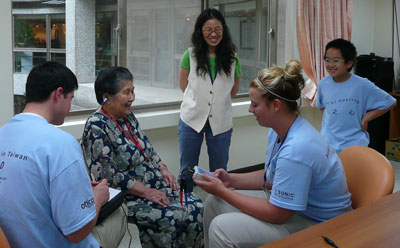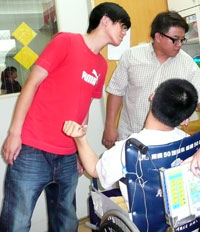 On the densely populated island of Taiwan, the concept of hearing tests is as novel as formally educated audiologists.
On the densely populated island of Taiwan, the concept of hearing tests is as novel as formally educated audiologists.
Providing those critical hearing tests to hundreds of Taiwanese children and adults became an eye-opening experience this May for NIU College of Health and Human Sciences professor King Chung and four of her audiology students.
“Most of the people we tested had never had a hearing test before. Wherever we went, more than half of the people had to be referred, which is unheard of in the United States,” said Chung, who teaches in the School of Allied Health and Communicate Disorders.
“The Chinese think, ‘OK, hearing loss comes with aging. If it is not a disease, we do not need to worry about it.’ So not many older adults take care of it,” added Chung, who grew up in Hong Kong. “Most people have a poor understanding of why it is necessary to have good hearing: If a person cannot communicate with friends and family, he or she may experience emotional isolation, worse physical health and a lower quality of life than a person who has good hearing.”
Chung and her students – Carissa Coons, Sarah Hyde, Jonathan Javid and Laura Wagoner – collaborated with audiology students from three universities and professional Taiwanese audiologists to test the hearing of more than 500 people.
Heading eastbound, their luggage included 18 hearing aids donated by a manufacturer.
Returning westbound, their hearts were packed with the knowledge that their Taiwanese collaborators would provide free follow-up services and hearing aid services to those patients identified with hearing loss who are unable to pay.
 They visited a nursing home, a community center for older adults, an orphanage, three special education schools and group homes for adults with special needs and children and adults with HIV or active AIDS. They also visited Cheng Hsin General Hospital to observe a pediatric cochlear implant surgery in the operating room while Dr. Joshua Chen, the chief otologist, explained the surgical procedures and anatomic landmarks while performing the surgery.
They visited a nursing home, a community center for older adults, an orphanage, three special education schools and group homes for adults with special needs and children and adults with HIV or active AIDS. They also visited Cheng Hsin General Hospital to observe a pediatric cochlear implant surgery in the operating room while Dr. Joshua Chen, the chief otologist, explained the surgical procedures and anatomic landmarks while performing the surgery.
Chung and Co. battled intense heat and humidity, mostly without the relief of air conditioning during testing. They were fortunate to reach the Christian Mountain Children’s Home during a window of opportunity between road closures for landslides and flooding.
They also encountered language obstacles but enjoyed the benefit of translation from the Taiwanese audiology students, whose textbooks are written in English.
Learning a few terms in Taiwanese, including “hello” and “thank you,” moved mountains.
“Children with disabilities often cannot tell their parents or teachers about their hearing problems. When they do not respond to verbal instructions, a natural inclination for their parents and/or teachers is to assume that they do not comprehend the instructions,” Chung said.
“With minimal Taiwanese vocabulary, an open heart, an open mind and lots of help from our Taiwanese partners, we were able to test the hearing of more than 250 Taiwanese children with special needs. It was truly wonderful and rewarding.”
Javid, entering his third year of the NIU’s four-year clinical doctorate program in audiology, is grateful for the exposure to diverse patients. The Sugar Grove resident also gained a stronger appreciation for audiology services in the United States.
“Here in DeKalb, we don’t really see a lot of special needs individuals, so that was a really good experience. We don’t speak their language, and they also have disabilities, so it was complicated,” Javid said.
“I also learned we’re truly lucky to have services we have here in DeKalb,” he said. “Our Speech-Language-Hearing Clinic is one of the best audiology facilities in the nation.”
Classmate Laura Wagoner, who enjoys testing hearing and telling people about hearing and hearing loss, had additional reasons for joining the Taiwan group. The Richmond native, also entering her third year of the Au.D. program, had never left the United States before.
“For me, traveling to a foreign country would take me so far out of my comfort zone that I felt it would be a good and interesting experience for me to test hearing in people whose language I don’t know,” Wagoner said.
“I learned I could get my message across without being able to fully communicate, learning new facial expressions and movements – not really sign language, but gestures that say, ‘I don’t know what words you’re saying, but I understand your facial expressions,’ ” she added. “I learned I could communicate effectively enough to let them know, ‘Hey, there’s something wrong.’ ”
Working with HIV and AIDS patients proved a greater challenge.
The communicable nature of the disease, coupled with the NIU’s group complete lack of any experience with that population, created some unease. Meanwhile, all of the residents of the group home “were abandoned and forgotten by their family, friends and society.”
“It’s really a taboo in Taiwan for anyone to have HIV or AIDS. But I thought, ‘If we don’t go, who else will go?’ So we scheduled a visit,” Chung said.
“Testing the residents with advanced AIDS was especially difficult for us emotionally. These patients, once lively and loved, were shells of their former selves … hearing loss was likely the lowest priority of their medical treatment, yet hearing may be their only connection to the world around them,” Wagoner added. “Only after caring for strangers who were so sick did we realize their fight and desire to be treated as any other human being.”
Wagoner said that lesson, as well as the visits to the orphanage and the special needs schools, will guide her eventual practice in this country.
“Everybody is still a person no matter what they’re going through,” she said. “We need to love them all the same. We need to treat them all the same, whether they have AIDS, whether they’re special needs or whether they’re the guy down the street. It’s common courtesy.”
Another “Heart of Hearing” humanitarian trip already is being planned for next summer to Brazil, Chung said.
